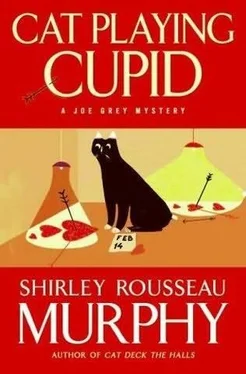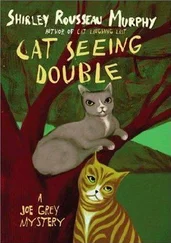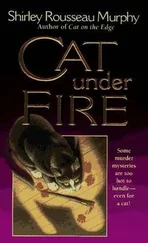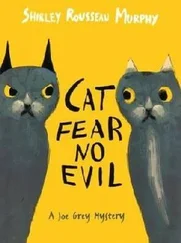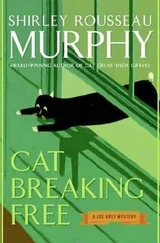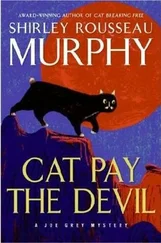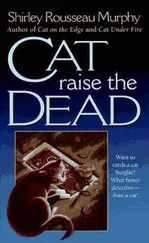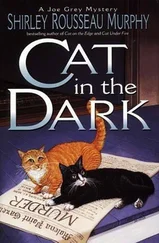Charlie said, "What happened after Stone Eye mauled Sage?"
"After that, Sage didn't fight for me anymore, but he still slipped away so we could be together. He helped me hide from the others and sometimes he'd lead the bullies away. And he brought me scraps from a kill or a garbage dump."
Kit frowned, her ears back, her whiskers flattening against her cheeks. "But still he thought Stone Eye was a good leader. He said we needed to be ruled by a strong paw. I never understood that, I never believed it had to be a cruel paw. When I got older, we argued a lot," Kit said, staring worriedly toward the closed door.
"Sage wouldn't run away from the clowder when I did, when I found Lucinda and Pedric up on Hellhag Hill and knew we were meant to be together. He was afraid to leave the clowder, he said only Stone Eye could protect us. He didn't trust Lucinda and Pedric, he had no faith in humans. I'm surprised he let you touch him, Charlie."
"He had no choice," Charlie said. "He was too hurt and weak to run. And Willow was right there, telling him to be still."
Joe looked at Kit for a long time, wondering. Earlier, when Charlie had first carried her into the surgery, when she'd first seen Sage, she had looked sick with fear for him, had let out a wailing mewl of shock and distress at how broken and weak he was. Even after they'd had their legs shaved and blood drawn for Sage, and Dr. Firetti had carried them in here to his office and to Charlie, Kit had been so filled with pain for Sage, it seemed her little cat heart would break-and yet there was this difference between them, which so deeply bothered Kit, Sage bowing to the tyrant's oppression while Kit defied such bullying.
***
I T WAS MOREthan an hour later when Dr. Firetti came out of the surgery wearing a clean lab coat and smelling of hand soap, and sat down to talk with them. Charlie, having left Joe and Dulcie and Kit in the office for a few minutes, had returned with her aunt Wilma. Dulcie's housemate, dressed in jeans and a red cashmere sweater, her gray hair tied back with a red cloisonné clip, sat now at the other end of the couch, holding Kit on her lap as Kit licked up a bowl of rich chicken soup. Dulcie lay behind Wilma along the back of the couch, her head on Wilma's shoulder.
Knowing the cats would be weak and emotionally wrung out after giving blood, Wilma had brought a thermos of canned soup, quickly warmed in Clyde's kitchen, and an array of party food from the buffet. Joe, at the other end of the couch, was gulping his share of shrimp canapés and little ham rolls stuffed with an assortment of cheeses, all therapeutic, of course.
"Sage did very well," Dr. Firetti said, "and is resting comfortably." Charlie smiled at the reassuring words used by most doctors. "The femur was broken in three places, so I've put in a metal plate, which is our best chance for sound healing. And I've put a pin in the one break in the tibia."
Charlie shivered. "Will he use the leg again?"
"I'm hoping he will, that it will heal as strong as it ever was. All we can do now is keep him quiet, care for him. And pray," Firetti said. "I want to keep him for a few days, to watch him. Then, Wilma, you're taking him home with you? That's closest," he said, "in case you need me at odd hours."
Charlie said, "I'll have to tell the Greenlaws that you know about the cats. And we'll have to tell Clyde and Ryan."
Firetti nodded. "Then Ryan knows, too?"
"She figured it out for herself," Charlie said. "It's a good thing she did."
Dr. Firetti laughed. "That would be an impossible situation after they're married, if Joe couldn't talk in his own house."
Joe looked at the doctor with more warmth, assessing this man who had, for all these years, known their secret and never said a word. "No one," Joe pointed out, "seems worried that I'll hold my own with those two. Ryan Flannery can be just as stubborn and smart-mouthed as Clyde."
Firetti smiled. "I wasn't worried about you, Joe. I don't think you'll have a problem."
Joe just looked at him.
"You've done all right keeping your investigations secret, holding your own with the law."
All five stared at Firetti. Wilma said, "You knew this, too? The police part?"
Firetti nodded. "It took me a while to figure that out. But I've known about the cats since long before Dulcie was born, Wilma. I was doctor to her mother.
"My father, when I was a boy, years before I grew up and went off to school and then joined the practice…he treated several generations of speaking cats. When I was about ten, a Molena Point woman married a Welshman and they resettled in the states, in Molena Point, near her family. They brought with them four pairs of speaking cats.
"They planned to breed and sell them, but of course they didn't tell the cats this. When two grew very ill, they were forced to find medical care, and they came to my dad. The way those cats responded to medication he found very strange-it took him a long time to treat them, they had lymphadenitis, but they didn't respond well to penicillin. He brought them through, but their reactions puzzled him.
"He had read tales of unnatural cats in parts of Wales and Ireland, and now, when he researched the matter, he began to suspect there might be some truth in the stories, as impossible as they seemed.
"And then, when he examined the cats' blood, he found it was not like any known type, not A or B, not AB. And of course it was not like any of the several subtypes, which were discovered more recently. AB is, in itself, extremely rare, but this blood was none of those, it was different. Confronted with this irrefutable fact, he began to believe the tales.
"He could find no medical reference to help him, not even the newest, ongoing studies-no medical research even in the British Isles, where he thought there might be more such cats. Either no other speaking cat had ever been in a veterinarian's office, at least with an illness that would stir curiosity, or any other doctor who had known the truth had kept it secret.
"Of course, his investigations were done quietly, he daren't tell anyone what he suspected. He could ask no doctor or medical facility for any kind of help, he had only the myths and folk tales-and the unrecorded blood type.
"At one point, he was inclined to diagnose himself with mental derangement, was convinced he'd lost his grip on reality. He grew so upset that my mother intervened. In her direct way, she went right to the cats.
"When two cats were brought into the clinic for nail trimming and shots, she insisted they speak to her, and she told them why. She explained how upset the doctor was, and how carefully he had kept their secret. At last one of them did speak."
Firetti smiled. "She was determined the young cat would answer her. But when he did, the experience left her deeply shaken. The cats told her that the Welsh couple, in order to get them to travel willingly, had promised that in America people would treat them like gods, that they would live pampered lives, would enjoy total freedom to come and go as they chose, and would enjoy, as well, all manner of fine foods and luxuries.
"When they arrived in the village, the couple kept them inside the house, saying they must wait until the time was right to announce themselves to the public. The cats were here, and so far were being treated well enough, though nothing like they'd been promised.
"But after many months of being shut in, they grew restless and morose, and determined to leave that place.
"They found the door and window locks a kind impossible for a cat to open. They grew more and more worried, they ceased to trust the couple, and soon they would not speak unless they were tormented and forced to.
"Then the couple sold two pairs. The other four cats were enraged, there had been no talk of selling them like common beasts. The buyers lived in the village, and when one pair of cats had kittens, which is rather rare, the buyers in turn sold them. When the cats in the Welsh house learned this, that they were indeed being treated like livestock, they wanted only to get away.
Читать дальше
